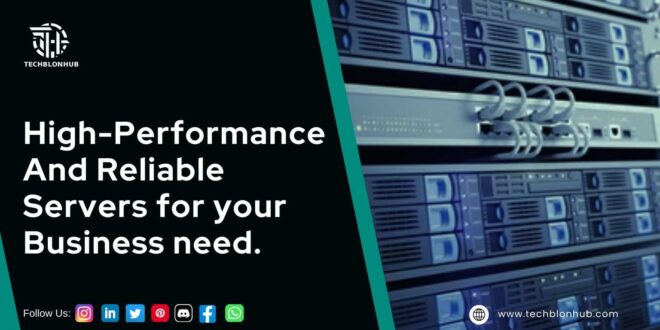However, selecting the ideal server for your company’s requirements can take time and effort. This blog will discuss the benefits of high-performance and reliable servers for your company’s needs and offer some advice on choosing the best server for your business.
Benefits of High-Performance and Reliable Servers
- Businesses that depend on network, storage, and data processing services require high-performance servers. These servers are perfect for businesses with high-traffic websites or applications because they are built to manage tremendous workloads, process massive volumes of data swiftly, and provide instant access to information.
- High-performance servers can raise your company’s general productivity and effectiveness. Employees can complete jobs more rapidly with higher processing speeds, reducing wait times and increasing overall productivity. High-performance servers can also handle several users and apps at once, making it simpler to manage and extend your IT infrastructure as your company expands.
- A reliable server can also increase the security of the data used by your company. The danger of data loss can be reduced, and your data can be secured by selecting a reliable server with automatic redundancy and failover abilities.
- When selecting a server for your company’s needs, reliability is yet another important aspect to consider. A reliable service can run constantly without experiencing any problems, allowing for unhindered use of data and applications. For businesses, downtime can be expensive because it can reduce production, revenue, and consumer time server confidence. Choosing a reliable server is important that operates dependably and satisfies the requirements of your business.
How to Select the Best Server for Your Business?
The following are some pointers to assist you in selecting the ideal server for your business
1. Evaluating Your Companies Needs
Firstly, you need to evaluate your business requirements to select the ideal server. What kinds of workloads and apps does the server need to support? How many people will be using the server at once? These are essential considerations when selecting a server.
Understanding the data processing and usage requirements of your business is essential. You should evaluate your business’s data requirements and consider the apps that are essential to your daily operations. A fast connection is essential if you run a business that depends significantly on the internet. The quantity of users who will access the server is another important consideration. The demand on the server increases along with the user base.
2. Ensuring Uninterrupted Access to Your Data and Applications
As was previously mentioned, reliability is a key aspect to consider when selecting a server for your company. To ensure continuous access to data and applications, look for a server that includes automatic redundancy and failover capabilities.
3. Performance Considerations
You should consider the performance that is determined by the central processing unit (CPU) and storage capabilities of the server. To reduce downtime and boost productivity, choosing a server with enough processing power and memory is essential. The server’s I/O capabilities and speed of connection are also crucial factors to consider as they significantly impact the server’s overall performance.
4. Future-Proofing
Selecting a server that can grow with your organization’s needs is crucial because it is possible that the company can expand and change over time. A server that can handle more apps, users, and workloads with the growth of your business is ideal for you.
Choose a server that can be upgraded in the future to make sure that your business can expand without being restricted by its server infrastructure. Your business will ultimately save money if you choose a server that can be easily upgraded because switching to a new server can be expensive.
5. Balancing Costs and Performance
Try to find the perfect mix between price, performance, and dependability when choosing a server. It’s vital to keep in mind that the server you select will play a significant role in your company’s IT structure. The expense of downtime, data loss, and subpar performance can quickly outweigh the cost of purchasing a high-quality server.
Conclusion
Any company that depends on technology to operate its operations needs high-performance and reliable servers. They provide several benefits, like increased productivity, enhanced safety, and uninterruptible accessibility to data and applications.
However, selecting the ideal server for your company can be difficult. You need to evaluate your organization’s requirements, take into consideration the server’s performance capabilities, ensure continuous access to data and applications, secure your investment, and create a balance between costs and performance to make an informed choice.
If you want to guarantee that the server is consistently performing at its peak, working with a reputable provider is also essential. They can help you through the selection process and offer continuous support. By following these suggestions, you can choose a server that is suitable for your business, enhances productivity, and boosts efficiency, ultimately producing superior financial results.

